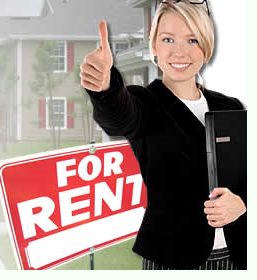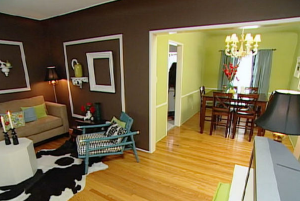Posted by Teresa on June 25, 2013 under Rental Market | 
 Ask a landlord in San Francisco or New York City how they feel about running their business in their city, and you might hear a long list of complaints. Rent control, tenants’ unions and plenty of regulations make those markets tough for landlords.
Ask a landlord in San Francisco or New York City how they feel about running their business in their city, and you might hear a long list of complaints. Rent control, tenants’ unions and plenty of regulations make those markets tough for landlords.
But of course, there are other cities that aren’t exactly ideal for landlords, for other reasons. These are the places where buying property and renting it out for a reasonable return on your investment is more challenging. Luckily, there are plenty of markets where it’s possible to buy a home for less than it costs to rent a typical home—so in theory, landlords can buy low and rent high. Of course, if it’s cheaper for landlords to buy, it’s also cheaper for homeowners to buy!
You’d be best off by analyzing your own financial situation and seeking investment advice from a professional before adding any properties to your portfolio.
Based on information from the real estate evaluation site Trulia, the following cities were rated as the “best” and “worst” places to be a landlord.
Best Places: Where it’s much cheaper to buy vs. renting:
| City |
Buying vs. Renting |
| Detroit, MI |
-70% |
| Dayton, OH |
-63% |
| Gary, IN |
-63% |
| Cleveland, OH |
-63% |
| Warren-Troy, MI |
-63% |
| Toledo, OH |
-62% |
| Memphis, TN |
-62% |
| Kansas City, MO |
-60% |
| Birmingham, AL |
-59% |
| Indianapolis, IN |
-58% |
Worst Places: Where it’s much cheaper to rent vs. buying:
| City |
Buying vs. Renting |
| San Francisco, CA |
-19% |
| Honolulu, HI |
-23% |
| San Jose, CA |
-24% |
| New York, NY |
-26% |
| Albany, NY |
-30% |
| Orange County, CA |
-32% |
| San Diego, CA |
-33% |
| Los Angeles, CA |
-35% |
| Long Island, NY |
-36% |
| Ventura County, CA |
-36% |
Posted by Teresa on June 19, 2013 under Landlord Tips, Tenant Credit Checks | 
 Have you been thinking about becoming a landlord? Do you think you have what it takes to be a successful one? Despite the rise in home prices over the past couple of years, it could still be a great time to purchase investment property in your neck of the woods. Mortgage rates remain at historic lows, and some bargains are still out there.
Have you been thinking about becoming a landlord? Do you think you have what it takes to be a successful one? Despite the rise in home prices over the past couple of years, it could still be a great time to purchase investment property in your neck of the woods. Mortgage rates remain at historic lows, and some bargains are still out there.
New landlords are typically new investors, but the club also includes folks who’ve had a hard time selling their homes, who are turning to renting to keep the mortgage paid. And while there are plenty of resources out there for newbies, the advice of seasoned landlords can be priceless.
Here’s a compilation of what it takes to be a successful landlord, as provided by our clients over the years:
Business acumen: Treating the landlording business like a hobby is a mistake. It’s a business, in which you are trying to make money. Never forget that. Be professional. Keep excellent records. Maintain procedures and follow them. Pay for professional tax and legal advice.
Toughness: You’ll have to enforce your rules in every situation, with every tenant or prospective tenant. At times, tenants will appeal to your softer side, asking for leniency, extensions on the rent or other favors. And you’ll have to be tough.
Patience: On the other hand, you’ll be dealing with people, not numbers. Being patient (and even kind) while enforcing your rules will go a long way to establishing a good rapport with your tenants. You’ll also need patience when your phone rings at 2 a.m., when a tenant stops up the sink for the fourth time and when your landscaping crew cuts back the wrong tree.
Outgoing personality: You don’t need to be s total extrovert or comedian to be a successful landlord. But you should be good at dealing with people, able to confront or engage them as the situation warrants, and ready to smile—even when you don’t feel like it. Remember, your tenants are your customers. A pleasant demeanor will go a long way.
Consistency: Some landlords apply the rules according to the tenant or prospective tenant. For example, Tenant A’s kids are allowed to have huge float toys in the pool because you like them better than Tenant B’s kids. Or, the nicely dressed white female prospective tenant does not have to undergo a tenant credit check, but the casually dressed minority male applicant does. The first scenario could make for upset tenants; the second could have you accused of discrimination. Be consistent with all of your rules, in every situation, for every tenant.
The ability to say “no”: You have certain obligations to your tenants, including safe housing, heat, water, trash pickup and functioning plumbing. Depending on the terms of the lease, you may also be obligated to provide Internet, cable TV, air conditioning or a clean swimming pool.
You are not obligated to provide housing to people who don’t meet your minimum requirements for credit history, income or employment. You’re not obligated to allow a tenant to rescue a kitten if you’ve a no-pets policy. And, you’re under no obligation to finance your tenants’ housing. You provide the housing, and they pay you. On time. You’re within your rights to say “no” to any and all other requests—and if you have a hard time saying “no,” you might not be cut out for the landlording business.
Posted by Teresa on May 31, 2013 under Landlord Tips | 
 Stewart, who lives in Pennsylvania asked us what we know about the success rate of landlords whose rental properties are located hundreds of miles away. He was thinking about buying a single-family house in Florida, where he has a vacation home. “It’s priced right, and I’m down there a couple of times a year,” he said. “But I think I’ll be worried about not checking on my property enough.”
Stewart, who lives in Pennsylvania asked us what we know about the success rate of landlords whose rental properties are located hundreds of miles away. He was thinking about buying a single-family house in Florida, where he has a vacation home. “It’s priced right, and I’m down there a couple of times a year,” he said. “But I think I’ll be worried about not checking on my property enough.”
Stewart is right to be worried. While he can certainly hire a property manager to keep an eye on things, it’s usually better for landlords to have hands-on management of their rental property.
Why? For one thing, property management costs money. Showing the property, vetting applicants, running background checks and collecting rent take time, and for that you have to pay—and it will consume a portion of your profits.
As Stewart mentioned, another good reason to be a local landlord is because you can check on your property more often. Driving by to see if any strange (as in criminal) activities are going on, checking to see if security lights are on at night and having the opportunity to chat with tenants are all benefits of hands-on rental management. When tenants know you, the relationship is going to be better, and they might even take better care of your property!
Absentee landlords usually have more problems with their rental properties, although they don’t always know it. More parties, calls to police, trash piling up and uncut lawns tend to occur where landlords are not in the picture. Visibility means something, both to tenants and to the neighbors that have to live with your tenants!
However, if Stewart is going to buy the Florida property, he should hire a PM. It’s too risky to manage a rental property through the Internet and mail. The right property manager is worth the money they charge, if they can fill vacancies, find the best tenants and see repairs and maintenance are kept up.
Posted by Teresa on April 5, 2013 under Housing Trends, Legal | 
 Not everyone loves a landlord. Some homeowners dislike having too many rental properties in their neighborhoods. They think that rentals decrease property values and degrade the community.
Not everyone loves a landlord. Some homeowners dislike having too many rental properties in their neighborhoods. They think that rentals decrease property values and degrade the community.
One town decided to take steps to limit the number of rentals allowed in a neighborhood. West St. Paul, Minnesota passed a law, effective January 1 of this year, which permits no more than 10% of homes on a block to be rental properties.
West St. Paul has had more than its share of foreclosures. Home values have fallen. But there’s little evidence that the number of tenants living in its neighborhoods has anything to do with it. Studies provide mixed results; some say higher rates of homeownership raises home values, but others conclude that even large, mixed-income, multifamily rental properties don’t affect the values of surrounding single-family homes.
Besides, with all the foreclosures in the town, where are former homeowners supposed to live? Not in West St. Paul. And not in Madison, Mississippi, which banned all rentals in 2009. In addition, what about homeowners who need to sell a home to take a better job elsewhere, but are unable to sell? What if they’re not allowed to rent their home? How many will walk away from their mortgages and ruin their credit history?
Not surprisingly, homeowners are not taking this lying down. They’re filing lawsuits, claiming that renting one’s own property is a legitimate property right.
Municipalities might mean well by limiting the number of rental properties on a block, but it seems like a recipe for disaster. Americans are demanding more flexible housing, with less upkeep and expense , the ability to move at the end of a lease without penalty and no worries about falling home prices wiping out their equity.
If surrounding homeowners worry about their home values, they can insist on stronger laws that support landlords’ efforts to keep their properties in good shape, and limit noise and other nuisances. They can get to know the landlord and the tenants that own and live in the rental properties in their neighborhoods. Communication is a better way to start than passing laws to prevent property owners from leasing their properties.
Posted by Teresa on January 21, 2013 under Housing Trends | 
 Some of the housing markets hit hard by the housing bubble were Phoenix, Las Vegas, Tampa and several markets in California. As prices fell to rock bottom levels, real estate investors made major purchases in these markets. And now, as prices begin rising, investment groups are looking for the next place to find a bargain.
Some of the housing markets hit hard by the housing bubble were Phoenix, Las Vegas, Tampa and several markets in California. As prices fell to rock bottom levels, real estate investors made major purchases in these markets. And now, as prices begin rising, investment groups are looking for the next place to find a bargain.
In Phoenix, the percentage of homes purchased by investors in November 2012 was 28%, down from August’s mark of 36%. Meanwhile, year-over-year home prices in Phoenix were up 24% in November, compared to 7.4% nationwide.
Investors are looking for new markets to buy homes and convert them to rental properties. According to a recent JPMorgan Chase research report, major institutional investors are planning to invest as much as $10 billion in the single-family rental market. Their targets? Three bedroom, two-bath homes in the $100,000 to $125,000 range. They’ll make repairs, rent them out, and bet on the price appreciating in the next several years.
That figure equals about 80,000 homes, out of approximately 12 million single-family rental homes across the nation, which are mostly owned by individual investors.
Some of the bigger players are:
- The Blackstone Group, which has spent $2.5 billion on 16,000 homes. It is purchasing around 2,500 homes each month.
- Colony Capital, which is investing up to $150 million per month this year, after purchasing 5,000 homes last year.
- Waypoint Homes, which expects to own 10,000 homes by the end of the year.
Many groups started in Phoenix, then went into California, Atlanta, Tampa, Orlando, Chicago, Las Vegas and Charlotte. Some are buying at a faster pace, perhaps because home prices are rising faster than expected. If prices rise above a certain point, they won’t bring high enough rents to make a sound investment.
Real estate markets in Atlanta and Tampa are now seeing the impact of investors coming in, with dozens of offers on foreclosed homes, many by cash-paying buyers. Good buys are becoming harder to find. Individual homebuyers are seeing more competition from small and large investors, resulting in bidding wars and reducing inventories of homes for sale.
Nationwide, investors purchased 19% of homes in November, according to the National Association of Realtors, which is down 23% from January and February 2012. Areas where investor sales are leveling off include Tucson; Oakland; Tacoma, Washington; Washington D.C. and Durham, N.C.
This pattern is expected to continue as home prices rise and investors exit out of markets, then return when prices stabilize.
Posted by Teresa on January 3, 2013 under Landlord Tips | 
 If you’re a landlord, you know there are some drawbacks to the business, like tenants who don’t pay rent on time, problems with noise and tenants who don’t take proper care of your property. It’s true that at times, your phone rings late at night with tenants’ plumbing and heating emergencies. And it’s true that some tenants must be evicted, which can cost you a bundle of time and money.
If you’re a landlord, you know there are some drawbacks to the business, like tenants who don’t pay rent on time, problems with noise and tenants who don’t take proper care of your property. It’s true that at times, your phone rings late at night with tenants’ plumbing and heating emergencies. And it’s true that some tenants must be evicted, which can cost you a bundle of time and money.
All of these problems will probably occur to most landlords at some point. But what could make each of these tenant problems worse? If they were happening in the same building in which you live! Messy, noisy tenants are one thing, but when they live next door, it’s a bigger nightmare. Tenants who constantly pay rent late are even harder to be nice to when they live downstairs from you.
Having tenants for neighbors can be unpleasant, but for many landlords, it’s a way of life. When you own a multi-unit building and have to live somewhere, why not live in your own property?
Here are some pros and cons of being a live-in landlord:
Pros
- You can keep an eye on tenant behavior, and put a stop to things like criminal activity, a business running out of the unit, or actions that are in violation of the lease.
- If the property needs any exterior repairs, you’ll know immediately.
- Undesirable tenants may keep looking when they hear you live in the building.
- You’ll care more about the property and take better care of it.
- Your tenants are not far away when it’s time to collect rent—and they can’t hide from you.
- Communication might be easier when you see your tenants on a regular basis.
- You can take advantage of owner-occupied mortgages, insurance policies, etc.
- You can subsidize your own housing costs.
Cons
- Tenants might knock on your door at all hours to complain or report a problem.
- Noisy tenants will affect your peace and quiet.
- It’s harder to live next to a tenant with whom you have issues.
- If a tenant locks him or herself out, they’ll be knocking on your door.
- Shared areas might not be maintained to your liking.
- Not all expenses are tax deductible.*
Live-in landlord situations can be successful, if both parties work toward it. Be sure to keep the communication flowing, respect your tenants’ privacy and address little issues before they become big problems.
*Disclaimer:
The contents of this article are intended for general information purposes only, and should not be relied upon as a substitute for obtaining legal, investment or tax advice applicable to your situation.
Posted by Teresa on November 30, 2012 under Housing Trends, Landlord and Tenant FAQs | 
 Do you furnish your rental properties or have you ever considered it? What are the advantages and disadvantages? We’ve looked around and found that while the vast majority of landlords rent their properties without furnishings, some find that doing so gives them an advantage for a niche that works.
Do you furnish your rental properties or have you ever considered it? What are the advantages and disadvantages? We’ve looked around and found that while the vast majority of landlords rent their properties without furnishings, some find that doing so gives them an advantage for a niche that works.
Advantages of furnished rentals:
• Higher rent: In some areas, furnishing a rental property can as much as double the rent.
• Higher-end tenant: With the right location, amenities and furnishings, you could attract a higher-end tenant, such as relocating executives or long-term vacationers with money to spend on a nice place.
• You’re covered: Security deposits don’t usually include the value of the furnishings (that would be cost prohibitive for most tenants), but in case anything is damaged or needs to be replaced, your insurance policy should cover it. Check with your agent.
Disadvantages of furnished rentals:
• More headaches in the maintenance department. You’ll need to add cleaning, repairing and replacing furniture to your maintenance list.
• Inventory troubles: Documenting the condition of furnishings at move in and move out times will be added work. Consider that many furnished rentals also include dishes, kitchen tools and silverware, and you can see that keeping inventory could be tedious. More stuff means more things to go missing, too.
• Short-term tenants. Folks who are looking for furnished apartments are not usually long-term lease signers. They’re often starting a new job in a new place, starting over in their personal lives, or in a temporary living situation due to an emergency.
As with anything, if you invest too little in your furnishings, you’ll probably have to replace them more often. On the other hand, it doesn’t make sense to spend a lot on furniture, electronics and lighting that could be subject to abuse. Think about your target market. If you’re going for lower-income tenants, you won’t be able to afford expensive furnishings. If you’re targeting executive, vacation or high-end tenants, they will expect nice furnishings—and be willing to pay for them.
If you’d like to gauge the demand for furnished rentals in your area, talk to local real estate agents. They often specialize in corporate relocations, or could refer tenants who are buying in the area but haven’t found the right property yet.
Start your tenant relationship off right by knowing who you’re leasing to. Protect your rental property and assets with tenant background checks. Proper tenant screening will ensure you are leasing to the best possible tenants.
Posted by Teresa on July 13, 2012 under Landlord and Tenant FAQs | 
 Not everyone is destined to be a landlord. It’s a tough profession, and it takes a tough person to do it successfully.
Not everyone is destined to be a landlord. It’s a tough profession, and it takes a tough person to do it successfully.
If you agree with the statements below, you might not be cut out for owning and leasing rental property.
- It’s okay to rent out a property without requiring tenants to complete an application.
- I don’t have a problem with tenants allowing their friends and family members move in without my knowledge or permission.
- Background screening and tenant credit checks aren’t that important. I go by gut instinct.
- If a tenant has trouble paying rent, I’ll take some of it out of the security deposit.
- A handshake is better than a written lease.
- I always give tenants a grace period to pay the rent.
- If there are three roommates in a property, I’ll accept three rent checks.
- I’d feel bad telling someone they needed to leave my rental property.
- If I don’t like how someone looks, I won’t rent to him or her.
- I’ll go out of my way to make things work with a tenant.
- Even a bad tenant is better than a vacant rental.
- I’m not familiar with the housing codes or rental laws in my state.
These are just a few ways to get in trouble, lose money or fail at being a landlord. What can you experienced landlords out there add to the list?
Posted by Teresa on October 11, 2011 under Housing Trends, Rental Market | 
 A new survey focusing on baby boomers and their home buying plans was released today by Coldwell Banker Real Estate. The survey of 1,300 agents and brokers finds that 87% of respondents have clients who already own or are looking to buy investment property. About 22% of agents responding said that at least half of their baby boomer clients fall into this category.
A new survey focusing on baby boomers and their home buying plans was released today by Coldwell Banker Real Estate. The survey of 1,300 agents and brokers finds that 87% of respondents have clients who already own or are looking to buy investment property. About 22% of agents responding said that at least half of their baby boomer clients fall into this category.
Jim Gillespie, CEO of Coldwell Banker Real Estate, said that baby boomers drive the U.S. economy; while they are a diverse group and cannot be generalized, their attitudes towards real estate can be telling. Right now, the economy is delaying boomers’ decisions to sell their existing homes, whether to downsize or relocate.
Coldwell Banker Real Estate’s data indicates that the boomers who can afford to are looking for a retirement home or a second home for investment, and many see now as the time to take advantage of lower home prices.
Additional survey findings:
- Younger baby boomers (ages 47 – 55) are more interested in purchasing a second home than older baby boomers (ages 56 – 64), by a margin of 34% to 22%.
- 31% of younger baby boomers are looking to sell an existing home and buy a larger home, compared to just 6% of the older group.
- Downsizing is more appealing to older (80%) than younger (52%) boomers. For the majority of older boomers, the reason for downsizing is not to save money, but to simplify their lives.
Interest rates are historically low, so younger baby boomers are actively seeking income streams for retirement. Perhaps they will be joining the ranks of the nation’s landlords, trading fixed annuities and bank CDs for property management guides and a set of handyman tools.
Posted by Teresa on September 13, 2011 under Housing Trends, Rental Market | 
 According to the U.S. Census Bureau, there has been a big jump from 2007 in the number of individuals and families doubling up in housing. The definition of “doubled-up” households are those that include at least one person over age 18 who is not in school, not the householder, and not a spouse or partner of the householder.
According to the U.S. Census Bureau, there has been a big jump from 2007 in the number of individuals and families doubling up in housing. The definition of “doubled-up” households are those that include at least one person over age 18 who is not in school, not the householder, and not a spouse or partner of the householder.
The Census Bureau says 69.2 million, or 30%, of adults were doubled-up in 2010, compared to 61.7 million adults, or 27.7% in 2007. Total American households who have doubled up due to unemployment or underemployment stands at 18.3%.
Much of the increase comes from people aged 25 – 34, living with their parents. That number increased from 4.7 million before the recession to 5.9 million (14.2% of the age group) in 2010.
The study was done as part of the Census Bureau’s wider report on income, poverty and health insurance. The report shows that household incomes dropped sharply last year. Since 2007, they have fallen 6.4%. Not surprisingly, the number of people living in poverty rose sharply, up for the fourth year in a row to 46.2 million people, or 15.1%.
If counted separately, some 45% of the young adults who live with their parents would fall below the poverty threshold. Because an entire household’s income is counted when determining poverty status, the group has an official poverty rate of only 8.4%.
What does the Census Bureau data mean for landlords?
- Fewer households mean lower demand for rental housing.
- Americans have less income to spend on housing and other necessities.
- Fewer home sales will continue to drag the housing market down.
- Once the economy starts to improve, many of the families and adult children will move out on their own, spurring a strong demand for housing.
Now, if only the economy would start to improve!
 Ask a landlord in San Francisco or New York City how they feel about running their business in their city, and you might hear a long list of complaints. Rent control, tenants’ unions and plenty of regulations make those markets tough for landlords.
Ask a landlord in San Francisco or New York City how they feel about running their business in their city, and you might hear a long list of complaints. Rent control, tenants’ unions and plenty of regulations make those markets tough for landlords.






 Not everyone is destined to be a landlord. It’s a tough profession, and it takes a tough person to do it successfully.
Not everyone is destined to be a landlord. It’s a tough profession, and it takes a tough person to do it successfully.
